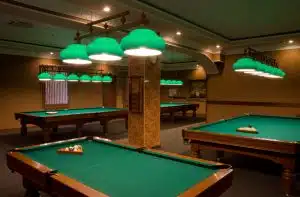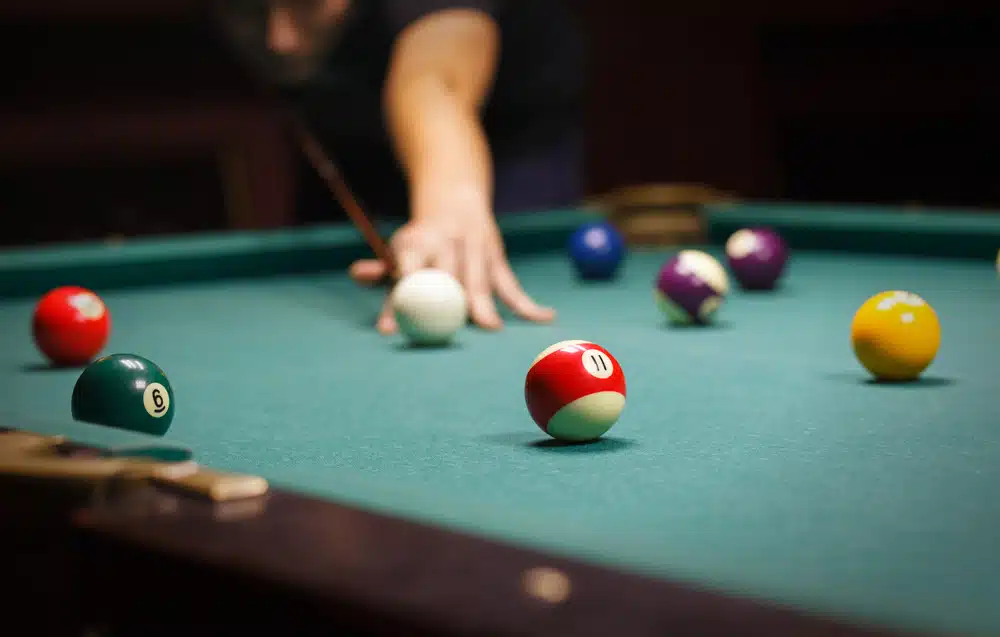 In the United Kingdom, pool halls are subject to a number of legal restrictions. Most notably, pool halls must be licensed by the local council in order to operate. This licensing process ensures that pool halls meet certain safety and hygiene standards.
In the United Kingdom, pool halls are subject to a number of legal restrictions. Most notably, pool halls must be licensed by the local council in order to operate. This licensing process ensures that pool halls meet certain safety and hygiene standards.
In addition, pool halls are required to have a designated premises supervisor who is responsible for ensuring that these standards are met. failure to comply with these regulations can result in hefty fines or even the closure of the business.
Furthermore, pool hall owners must take care to ensure that their customers are not drinking alcohol on the premises. If they are found to be doing so, they may face prosecution under the Licensing Act 2003. As a result, pool halls in the UK must take care to operate within the bounds of the law in order to avoid any legal difficulties
Depending on your pool hall’s products and services, you will need to comply with specific legislation.
What licences does a pool hall need?
To operate a pool and snooker club, you do not need a license, but if you plan to serve alcoholic beverages and food or hold pool or snooker events in your club, you must take certain steps.
Selling alcohol and food
There are several licenses you will need to obtain to run a bar on your premises:
- In England and Wales – a premises license from your local licensing authority covering the sale of alcohol, the provision of regulated entertainment and the supply of hot food between the hours of 11.00pm and 5.00am (late night refreshment – sometimes late-night refreshments do not require licensing). On the Gov.uk website, you can learn more about alcohol, late night refreshment, and entertainment licensing in England and Wales.
- In England and Wales – A personal licence from your local licensing authority authorising a designated responsible person (for example you, or a manager) to supervise the above activities.
- In Northern Ireland – a county court alcohol licence. Alcohol licences are generally more difficult – and often much more expensive – to obtain in Northern Ireland than elsewhere in the UK. It may be necessary for you to find someone who is willing to sell you an existing licence. The NI Direct website has more information about alcohol licensing in Northern Ireland.
- In Scotland – In 2009, a revised licensing system was introduced that is similar to that in England and Wales. It is necessary to obtain both a personal and a premises licence from your local licensing board. Visit the Scottish Government website to learn more about alcohol licensing in Scotland.
Rather than operating as a proprietary club, you may operate as a ‘qualifying’ members club. If you run a proprietary club commercially for profit, you will require a Club Premises Certificate instead of a premises licence and a personal licence to sell alcohol and provide regulated entertainment. Visit Gov.uk for more information.
A local authority environmental health department must also be notified if you plan to provide any catering services. It is important to note that vending machines are not required to be registered if they sell only food. However, the machines must comply with regulations governing food hygiene.
Other licences that you might need
Additionally, you may need:
- A licence to hold an indoor sports event, such as a pool or snooker tournament. A licence may be required for indoor sports events, which fall under the Licensing Act as ‘regulated entertainment’ – most indoor sports events with an audience of up to 1,000 between 8am and 11pm do not require a licence, but those held outside those hours or in front of more than 1,000 do.
- Your local licensing authority must issue you a gaming machine permit. In Great Britain, you are automatically entitled to two Category C or Category D machines (although this entitlement must be activated). A gaming machine permit is required if you plan to offer more than that number. Your alcohol licence in Northern Ireland entitles you to a certain number of gaming machines. When you apply for a license, the licensing authority will determine how many you can have. Without a separate gaming machine permit, you can have a maximum of three machines if you have a club permit for serving alcohol
- A licence from the Security Industry Authority (SIA) is required for door supervisors
- The use of background music and/or music videos requires a Music Licence from PPL PRS Ltd
- TV licenses
Alcohol licensing legislation
Alcohol sales are regulated by:
- England and Wales Licensing Act
- Licensing Order (Northern Ireland)
- Scotland’s Licensing (Scotland) Act
It is necessary to obtain the appropriate license and comply with the law if you intend to sell alcohol. Throughout the UK, you can find more information about alcohol licensing at:
- The Gov.uk website
- NI Direct
- The Scottish Government
Gaming legislation
Gaming legislation applies to coin-operated amusement machines offering games of chance. Gaming machines (category C and/or category D machines) can be provided in Great Britain under the Gambling Act. If you plan to provide more than two machines, you must notify your local licensing authority. A licensed premises gaming machine permit is required if you plan to provide more than two machines. A permit will specify how many machines you can have.
If you have an alcohol license in Northern Ireland, you are entitled to a certain number of gaming machines. The licensing authority determines how many you can have when you apply for your license, but there isn’t a set limit. Visit the Gambling Commission website to learn more about gaming laws in Great Britain. Northern Ireland’s gambling laws are available on the Department for Communities website.
Machine Games Duty (MGD) applies to gaming machines (including skill with prizes machines), so you must register with HMRC and submit your MGD return and payment at the appropriate time. The Gov.uk website has more information about MGD.
Retailing
It is important for you to be aware of the various laws that apply to retail outlets and that protect the interests of consumers if you decide to have a retail outlet in your club (for example, selling snooker and pool accessories). Goods and services must not be described in a misleading manner, and their retail prices must be clearly displayed. All goods and services must meet your expectations and be suitable for their intended purpose.
Food safety
There is strict food safety legislation that must be followed by all businesses in the food sector. Registration with the local environmental health department is required before you open your business. Environmental health officers can provide you with advice and guidance about what you need to think about installing in your premises to ensure food safety and hygienic conditions.
Workplace smoking ban
You must display appropriate ‘No Smoking’ signs in all public places, clubs, workplaces, and work vehicles. For more information on how the ban affects you, contact your local authority. Visit the HSE website for more information.
Data protection
If you keep computerised records of individuals’ personal, or use a CCTV system, you may need to register with the Information Commissioner’s Office (ICO). Even if you don’t need to register, you’ll still need to comply with data protection legislation. Visit the ICO website for more information.
Health & Safety, fire
Fire and health safety regulations must be followed at work.
Employment legislation
Employment laws must be followed by anyone who employs staff. Employment laws cover such areas as recruitment, employment contracts, pay, working hours, holidays, employment policies, sick leave, maternity leave, paternity leave, discrimination, discipline, grievances, dismissals, and redundancies.
Insurance for a pool hall
Describe your business’ operations to an insurer or insurance broker – they’ll explain what insurance cover you must have by law, and what else you should consider. Examples include:
- Premises, accidental damage to pool and snooker tables, fixtures and fittings, glass breakage and stock
- Cash
- Business interruption
- Employers’ liability
- Public and products liability
- Motor insurance
Conclusion
Pool hall business owners need to be aware of legal issues that they come across, these include holding the correct insurance, fire regulation and complying with the licensing act. It is the responsibility of the business holder to hold other public and employers insurance to defend any future legal issues from both employees and customers. The licensing act also requires business owners that offer alcohol for sale that they comply with local council and police enforcement teams should the occasion arise.
Lee Jones is a seasoned Business Finance Specialist with over two decades of invaluable experience in the financial sector. With a keen eye for market trends and a passion for helping businesses thrive, Lee has become a trusted advisor to countless organizations seeking to navigate the complexities of finance.


